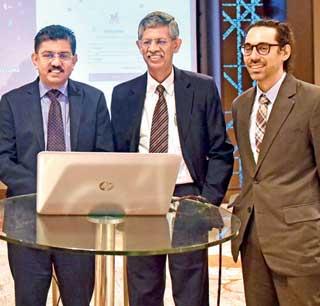- CEA to closely monitor progress of proposed mechanism
- EPR road map developed by CCC and BSL with funding from USAID
- Private sector expected to declare annual plastic usage and pledge a collect back target
- Reporting of waste collection and recycling to be done via an online system
- Environment Ministry urges private sector to maintain necessary records to demonstrate their commitment to EPR
In an effort to improve the waste management system in the business community, the Ceylon Chamber of Commerce (CCC) together with the Environment Ministry has proposed for the private sector the ‘Collect-Back’ model for plastic wastes.
|
Environment Ministry Secretary Dr. Anil Jasinghe launches Collect-Back EPR system in Colombo in the presence of CCC CEO and Secretary General Manjula de Silva (second from left) and USAID Sri Lanka and the Maldives Acting Economic Growth Office Director Micah Globerson |
Collect-Back is an extended producer responsibility (EPR) model, which requires all stakeholders generating plastic waste to take responsibility for recycling and minimising the use of plastic packaging.
The Central Environmental Authority (CEA) will closely monitor the progress of proposed mechanisms and complete the legal provisions required for meeting the efficient outcomes from each method.
At the launch event of the EPR model held earlier this week in Colombo, the Environment Ministry and CEA reiterated the necessity for the private sector to adhere to the EPR principle with the best available technologies.
The CCC and Biodiversity Sri Lanka (BSL) developed the EPR road map in 2021, with financial support from the United States Agency for International Development (USAID).
The objective was to provide a strategic plan for plastic waste management in Sri Lanka. The implementation of the Mandatory Reporting and Collect-Back (MRCB) model was recommended under this EPR road map.
The MRCB model requires plastic users to declare their annual usage and pledge to collect back an agreed-upon percentage, targeted to reach close to 100 percent over a five-year period. The initiative aims to increase plastic waste collection and recycling in order to minimise plastic pollution.
The proposed Collect-Back Target model has been endorsed by the Environment Ministry and CEA and welcomed by the private sector.
“There is an urgent need for an integrated and collaborative approach within the plastic value chain, in order to implement a sustainable framework, ensuring effective and effective plastic waste management. The Collect-Back Target model will help to promote greater accountability among corporates and ensure an efficient system of monitoring and evaluation,” said CCC CEO and Secretary General Manjula de Silva.
The private sector will commence reporting of waste collection and recycling through the online reporting system. The initial phase will focus on two types of plastics, namely, polyethylene terephthalate (PET) and high impact polystyrene (HIPS) packaging. The outcome of the voluntary EPR implementation will be documented to draw lessons that can be applied to a mandatory collection and reporting system in the future.
The project is guided by a high-level multi-stakeholder project steering committee, co-chaired by the Environment Ministry secretary and CCC secretary general.
Meanwhile, the CCC and Environment Ministry urged all private sector companies using plastic packaging to intensify their voluntary plastic collection and recycling initiatives and from 2022 onwards to maintain the necessary records, in order to demonstrate their commitment to EPR.
Read More: ‘Collect-Back’ plastic waste management model for private sector – Business News | Daily

